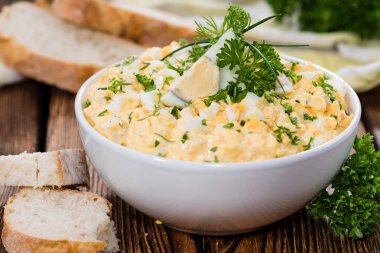Egg salad is a classic dish that is loved by many. It’s made by combining hard-boiled eggs with mayonnaise, mustard, and other seasonings. While egg salad is a delicious and easy-to-make meal, it can be challenging to find healthy things to eat with it.
Many people struggle with finding the right balance of nutrients to complement the rich and creamy egg salad. If you’re looking for healthy and tasty options to pair with your egg salad, you’re reading the right article!
In this post, we will reveal to you some of the best healthy foods to eat with egg salad that will not only enhance the flavor but also provide the necessary nutrients to make it a well-rounded meal.
These healthy things to eat with egg salad will help you whether looking to cut back on calories, or increase your protein intake, or add more veggies to your diet. Without further ado, read on to some delicious and healthy ways to enjoy your egg salad!
10 Healthy Things to Eat with Egg Salad
Here are the healthy things to eat with egg salad:
1. Whole grain bread or wraps
Opt for whole grain bread or wraps to create a nutritious, fiber-rich sandwich. Whole grains provide complex carbohydrates and additional fiber, which can help keep you full and provide sustained energy. You can take it with a chilled smoothie for dinner.
To add to that, whole grains provide important nutrients like B vitamins, iron, and magnesium that are essential for maintaining good health.
When paired with egg salad, whole grain bread or wraps provide a source of complex carbohydrates that can help to balance out the protein and fat content of the egg salad, making it a well-rounded and nutritious meal.
2. Leafy greens
Include a bed of leafy greens, such as spinach, arugula, or mixed salad greens, either as a side or as a base for your egg salad. Leafy greens are loaded with vitamins, minerals, and fiber, adding freshness and crunch to your meal.
Adding a handful of leafy greens to your egg salad can provide a refreshing crunch and a burst of flavor, while also increasing the nutrient density of the meal.
3. Fresh vegetables
Add various fresh vegetables to your egg salad or serve them as a side. Sliced tomatoes, cucumber, bell peppers, radishes, or shredded carrots can provide added nutrients and texture. You can pair the combo with brown rice and serve it as lunch.
4. Avocado
Slice or mash some avocado and add it to your egg salad. Avocados are a good source of healthy fats, fiber, vitamins, and minerals. They add creaminess and richness to the egg salad.
5. Greek yogurt or mayo substitute
Instead of traditional mayonnaise, consider using Greek yogurt or a mayo substitute made from healthier ingredients. This can reduce the calorie and fat content while adding a tangy flavor and creamy texture.
6. Whole grain crackers or rice cakes
If you prefer a lighter option, serve your egg salad with whole grain crackers or rice cakes. These provide a satisfying crunch and are an excellent alternative to bread.
7. Vegetable crudité
Prepare a platter of colorful raw vegetables like carrot sticks, celery sticks, bell pepper strips, and broccoli florets. These provide crunch, fiber, and an array of vitamins and minerals.
8. Sliced fresh fruit
Add a serving of sliced fresh fruit, such as grapes, berries, or melon, to balance the flavors and provide natural sweetness. Fruits are packed with vitamins, minerals, and antioxidants.
9. Quinoa or brown rice
Serve egg salad alongside a small portion of cooked quinoa or brown rice. These whole grains provide extra fiber and complex carbohydrates, keeping you satisfied and sustaining energy. This can serve as a perfect lunch!
10. Bean salad
Prepare a simple bean salad using canned beans (black beans, chickpeas, or kidney beans), diced vegetables, and a light dressing. Beans are an excellent source of plant-based protein and fiber. The bean salad with egg salad is a powerful combo.
Conclusion
As you have seen, there are a lot of healthy things to eat with egg salad. Nonetheless, remember to choose ingredients that align with your dietary preferences and any specific dietary restrictions or considerations you may have. Adjust the quantities and portion sizes based on your individual nutritional needs.








